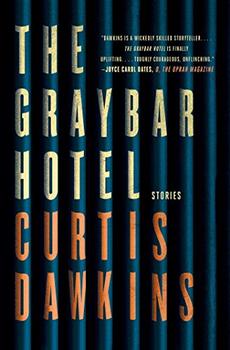Summary | Excerpt | Reviews | Beyond the Book | Readalikes | Genres & Themes | Author Bio

Stories
by Curtis Dawkins
"Yeah, yeah," Tom said. "Tale told by an idiot. Signifying shit. That's deep, man. I like that."
Kalamazoo is the Native American word for "boiling water." Rumor had it the county jail was built on an ancient hot spring filled in with loamy soil, and the whole building was slowly sinking as a result. After thirty-four years, the thought of Indian soil reclaiming the jail was nothing but a fairy tale, but that didn't stop anyone from talking about it after the television was turned off. The fantasy beat the reality. I would occasionally wake from dreams in which a ghostly chief, screaming in vengeance for his land, would split the building in half and we would all jump out and flee, racing on wild, galloping horses away from the jail as it was sucked down into the earth.
We were in A North wing, where the lights never went out. A North was suicide watch and though very few of us had actually tried to kill ourselves, we were all somehow a concern to the powers that be. I had never been to jail, and I was going to be locked for up a long time, so the county kept the high-watt rays of worried lights on me at all hours.
Along with the lights were the guards who walked past every seven minutes, like the steady sweep of a lighthouse beam. They would walk up to the bars, look in, and minus any scene of horror, they'd walk away without a word. Sometimes I'd ask about the weather, and sometimes they would answer, and it felt good to know that the outside was still there. But mostly the only way to get a guard's attention was to die, or press the panic button marked emergency only in red, stenciled paint above the phone.
A North had eight cells—half held four inmates and the other half held six. But the jail was always overcrowded, so there was usually an extra man or two in each. I had been the fifth man in Cell 7, so I'd taken a mat on the floor in the dark corner by the door. Cellmates came and went, and I could have rightfully taken one of the bunks on the west wall, but as the methadone ran out I found comfort in the dimness of my corner. I lay there and sweat and shook, and tried not to think too much, and memorized the Twenty-third Psalm and recited it minute by minute, hour by hour.
I had Bob Barker every weekday morning, though. There were the games, the new cars, the spinning wheel, the showcases. Sometimes tears would fill my eyes when a lucky member of the audience would high-five their way through the crowd to stand on the contestant's row. They were so genuinely happy to be given a chance, and as they looked at Bob brightly lit onstage, it must have seemed like a better life was right there for the taking.
Their hearts' desires were a possibility—and not in some distant future, but right then, or at least for the next hour. But Bob Barker and a screaming studio audience can only go so far as company, so by the time Italian Tom walked into A North 7, I guess I was ready.
Tom had moved on from talking about the hit-and-run to acting it out, standing up in the cell and moving in slow motion, like a marionette with joints held together by pins. He explained that, in fact, most of his bones and joints were metal, and he was only able to move freely after he'd been up and moving for a few hours, longer if the temperature was cold. "I'm still a little stiff," he said as he took off his shirt. It was January and only ten-thirty.
Tom's torso was half green with tattoos. After just a couple of months in jail, I'd learned to recognize tattoos inked in prison—they're green or gray and lack the sharp lines of a professional needle. Prison artists use whatever they have, usually a sharpened guitar string rigged to the motor of a cassette player. The ink is made of soot mixed with spit, sometimes urine, and the art, while brilliant and precise in concept, is dull and faded on the flesh. Tattooing in prison is like trying to sew fine stitches with a knitting needle. It's the essence of prison ingenuity—that so much can be done with so little.
Excerpted from The Graybar Hotel: Stories, by Curtis Dawkins. Copyright © 2017 by Curtis Dawkins. Excerpted with permission by Scribner, a Division of Simon & Schuster, Inc
Your guide toexceptional books
BookBrowse seeks out and recommends the best in contemporary fiction and nonfiction—books that not only engage and entertain but also deepen our understanding of ourselves and the world around us.